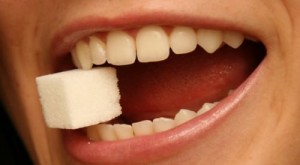Everyone loves sugar! It is in most of our guilty pleasures like desserts and sodas. The taste of the sweet delight is almost addictive in some cases and it doesn’t help that its found in many of our foods as an additive.
Americans consume more that 22 teaspoons of “added sugar” a day. That adds up to about a 14 lb sack of sugar a year. Having too much is very detrimental to your health.
Excessive Sugar in the Diet
According to the Centers of Disease Control and Prevention, excessive sugar is so deadly in the diet that it has recently been found that the added sugar the average American consumes can increase their risk of death from heart disease by almost 20%. And if the person gets a fourth of their calories from it, it begins to double their risk.
Along with the risk of heart disease, other risks that fall under that category are obesity, diabetes, cavities, and possible tooth loss are possible.
Most of the consumption today happens through the sources of sodas, energy drinks, and sports drink. Although a sports drink has other benefits for an athlete or person who regularly exercises, these beverages are packed with great amounts of sugar.
Other popular sources are candy, ice cream, bakery goods, frozen yogurt and ready-to-eat cereals.
How Much Sugar Should You Consume?
There is not a specific amount that has been measured such as for fats and salt; but the Institute of Medicine recommends that added sugars make up less that 25% of the diet.
The American Heart Association recommends that women consume less than 100 calories of added sugar per day and that men consume less that 150 calories per day. So for women that is about 6 teaspoons and about 9 teaspoons for men.
A real life comparison of exactly how much that equals too would be one 12 ounce can of regular soda. Most people consume multiple sodas a day so that puts into perspective how easy and often we get too much sugar.
5 Ways to Decreasing Sugar Consumption 
Here are a few easy ways to overcome the sugary temptations of food.
- Slow down on the sweetened beverages. Almost 40% of added sugar come from these things. Like stated earlier, you should only be consuming one can of soda. That is the recommended amount that should be your diet. Replace these with flavored spiked water. You can add lemon, mint, lime, strawberries, cucumber or even the low calorie flavor packets like MiO.
- Check those ingredient lists! Sometimes it’s hard to just be able to tell how many calories of sugar are in something with just the basic label. Check the ingredient list for the culprits.
- For example a bag of raspberries. If it is just a bag of frozen raspberries but the label says 5 grams of sugar you wonder how that can be when nothing else is in the bag. Looking at the ingredient list will solve the mystery.
- Common names that indicate sugar are: brown sugar, corn syrup, maltose, fructose, dextrose, molasses, agave, brown rice syrup, cane sugar, can syrup, and evaporated cane juice.
- By law, ingredients must be listed in descending order by the weight of them. So the more sugar dense ingredients will be listed first.
- Buy plain foods and manually sweeten them! Getting something plain (unsweetened) is easier to manipulate when getting control of consumption. When you have something basic like Greek yogurt you can control the amount of sugar added better by adding honey or a couple of berries to sweeten the taste.
- Fruit substitute! One of the easiest ways to decrease sugar intake is to replace it with fruit. Fruits are naturally sweet and more healthy for you because of the natural components. For example, instead of putting jam on your toast put some warm strawberries sprinkled with cinnamon on it. It is more healthy because of the lack of high fructose corn syrup and sugar used in creating the jam.
- Limit the number of times you consume a highly sugar dense food. It is not realistic to try to go without sugar completely but you can limit the times you do intake it. Try a goal for twice a week. You can soothe your sweet tooth and have a free day to eat whatever sugary thing you want. Knowing that you can have it and not be penalized helps stop the sweets binges and the temptation of over consumption.
Doing these will not only decrease your risk for heart disease but you’ll also lose some pounds as a bonus!



